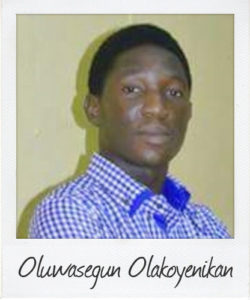“Calling for a transparent budget process”
May 11 Oluwasegun Olakoyenikan, 22, a Correspondent from Benin City, Nigeria, makes the case for an open state budgeting system, arguing that it will improve the level of transparency and accountability in governance.
Oluwasegun Olakoyenikan, 22, a Correspondent from Benin City, Nigeria, makes the case for an open state budgeting system, arguing that it will improve the level of transparency and accountability in governance.
A budget is considered open if citizens have access to budget documents and a high level of involvement in the budgetary process.
Corruption in many cases for nations of the world can be traced to their budgets, where the policies in the budgets may be formulated in secret without the citizens’ knowledge, often to the benefit of corruption.
For many years and still counting, Ondo state people are being left in the dark about the state finances and policies. No wonder it is easy for some individuals to make assumptions about the state’s financial status or how the state’s funds were spent.
What, then, is the essence of the democracy we practice if citizens don’t have access to how government raises and spends money?
If the people must have trust and repose confidence in a government, the opening of the budget for proper critique cannot be jettisoned.
Even though the first quarter of this year is gradually winding off, little effort is being made on the passage of the state’s 2017 budget proposal. It is evident that the state is currently being run by the 2016 budget, by unaccounted funds, or both. Which ever way it takes, it fails the test of accountability and transparency.
The state’s people, irrespective of their gender, religion, or political affiliation, should be aware of all government policies, budget, assets procurement records, and status of funds. To this end, a platform where this information will be readily available should be developed to enable the citizens to make necessary verification and monitor the state’s funds.
Just like Kaduna state government, Ondo state government can follow a cue by partnering with a civic tech organisation to provide a citizens’ budget in a simplified version that the average citizens can understand and relate to the numbers.
Several states in Nigeria already have their 2017 budgets approved by their respective Houses of Assembly and the content made available to the public. Ondo state lags behind after a failed attempt.
As the citizens #ThinkAnew, the government is expected to #ActAnew.
I hereby humbly implore the Ondo State Governor to consider this as another “#ActAnew” approach, as it will help restore people’s trust in governance through his government.
Reach me on Twitter: @SegunAndrews.
photo credit: FootMassagez Silver and Gold Coins – Credits to https://costculator.com/ via photopin (license)
…………………………………………………………………………………………………………………
About me: I am a citizen journalist trained by the International Centre for Journalists (ICFJ) to report vital health, environment and poverty related issues in the Niger Delta region of Nigeria.
I stepped up in my journalism career with training by the Bloomberg Media Initiative Africa (BMIA) to become a financial, economic and business journalist.
I report economic data, trading sessions from Nigeria Stocks Market and other key financial institutions.
I am a passionate young man who has determined to keep telling the stories behind public data.
…………………………………………………………………………………………………………………
Opinions expressed in this article are those of the author and do not necessarily represent the views of the Commonwealth Youth Programme. Articles are published in a spirit of dialogue, respect and understanding. If you disagree, why not submit a response?
To learn more about becoming a Commonwealth Correspondent please visit: http://www.yourcommonwealth.org/submit-articles/
…………………………………………………………………………………………………………………






